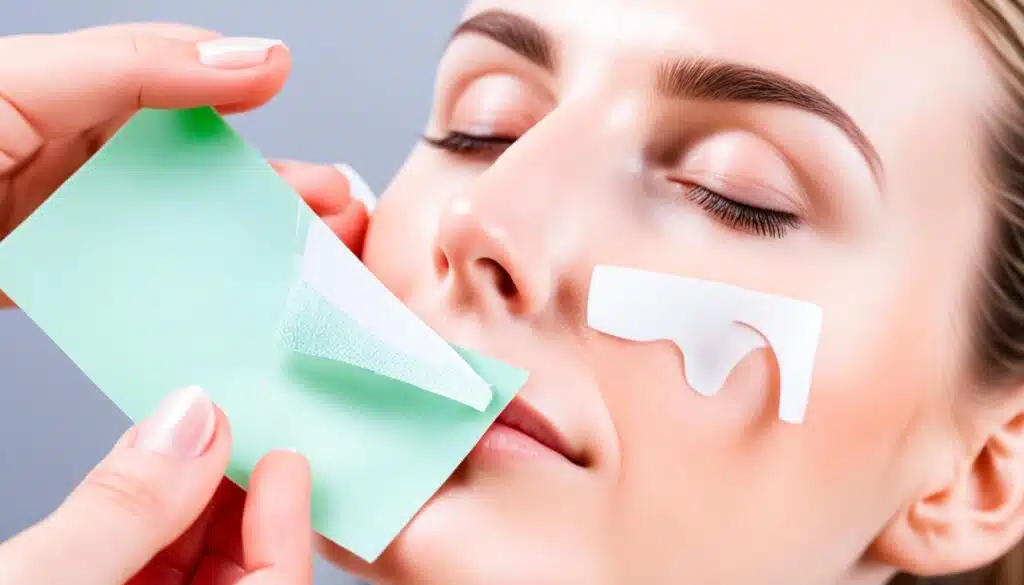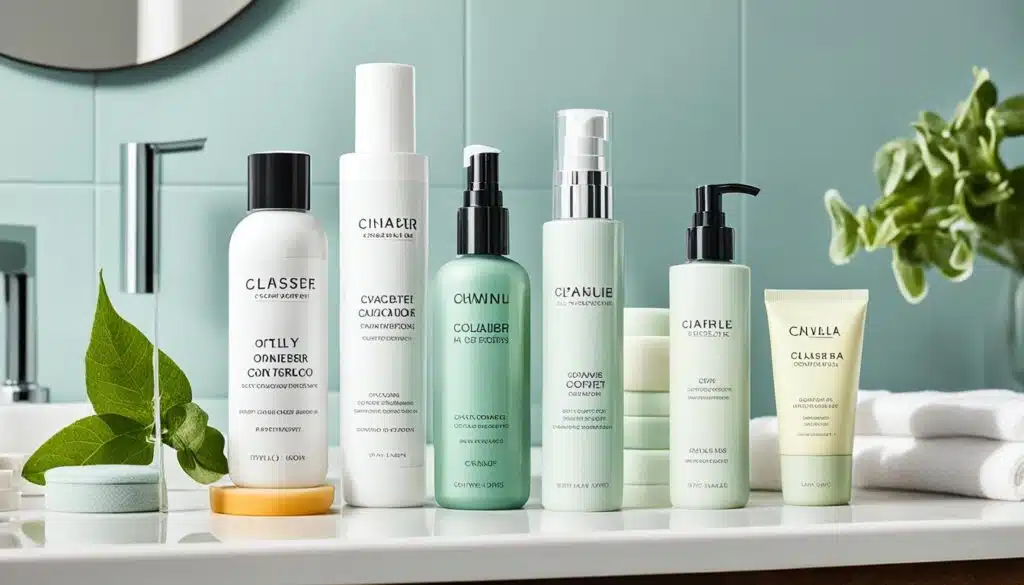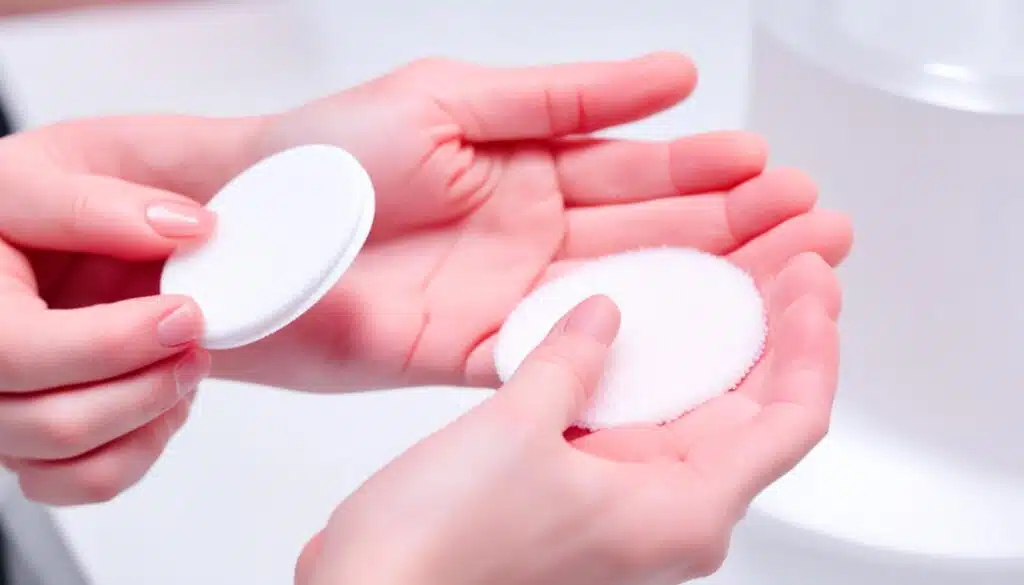Skin Care For Oily Skin can be challenging to manage, but with the right skin care tips, you can achieve a balanced complexion. In this article, we will provide you with the best skin care tips for oily skin based on expert advice and research.
Key Takeaways: Skin Care For Oily Skin
- Developing a daily skincare routine for oily skin is crucial for managing excess oil and achieving a balanced complexion.
- Understanding the causes of oily skin, such as hormonal imbalances and genetic factors, can help you better manage and address the issue.
- Choosing skincare products specifically formulated for oily skin, such as lightweight and non-comedogenic options, can prevent clogged pores and breakouts.
- Gentle cleansing with a foaming cleanser and proper moisturization with non-comedogenic hydrating products are essential steps in the skincare routine for oily skin.
- Removing makeup before bed and practicing oil control measures, such as avoiding excessive face touching, can help prevent breakouts and manage oily skin effectively.
Understanding Oily Skin
Oily skin is a common skin type characterized by the skin’s tendency to produce excess sebum, the skin’s natural oils. This excess sebum can lead to several skin concerns, including enlarged pores, blackheads, and whiteheads.
When you have oily skin, your skin’s oil glands produce more sebum than necessary, resulting in a shiny appearance and a greasy feeling. The excess sebum can clog the pores, making them appear larger and more visible. This can lead to the formation of blackheads and whiteheads, which are caused by the buildup of dirt, oil, and dead skin cells within the pores.
Understanding your skin type is essential in developing an effective skin care routine for oily skin. By understanding the characteristics of oily skin, you can tailor your skincare routine to address specific concerns such as excess sebum production, enlarged pores, blackheads, and whiteheads.
- Increased sebum production
- Enlarged pores
- Blackheads
- Whiteheads
With this understanding, you can focus on incorporating skincare products and practices that help balance oil production, unclog pores, and keep your skin looking fresh and healthy.
Expert Tip: Oily skin can be prone to acne breakouts, but keeping the skin clean and properly hydrated can help reduce breakouts and improve the overall appearance of oily skin.
Causes of Oily Skin
Oily skin can be caused by various factors that contribute to an overproduction of **sebum**. Understanding these causes is essential for effectively managing oily skin and achieving a balanced complexion.
- Hormonal imbalances: Hormones play a significant role in sebum production. Fluctuations in hormone levels, such as during puberty, menstruation, or pregnancy, can lead to increased sebum production and oily skin.
- Genetic factors: Your genetic makeup can influence your skin type, including oily skin. If your parents or close relatives have oily skin, there is a higher likelihood that you will also experience it.
- Overwashing or using the wrong cleanser: While it may be tempting to cleanse your skin excessively to combat oiliness, overwashing can actually strip away the skin’s natural oils and trigger an overproduction of sebum. Additionally, using a cleanser that is not suitable for oily skin can further disrupt the skin’s balance.
- Age-related changes in sebum production: As we age, our hormone levels fluctuate, and sebum production may change as a result. This can lead to an increase in oiliness, particularly for women during menopause.
- Skipping moisturizer: Some individuals with oily skin mistakenly believe that they don’t need to use moisturizer. However, skipping moisturizer can actually cause the skin to produce more sebum to compensate for the lack of hydration, leading to increased oiliness.
By identifying the underlying causes of oily skin, you can tailor your skincare routine to address these factors and effectively manage oiliness. It is important to find the right balance between controlling excess oil and maintaining the skin’s natural moisture levels.
Essential Skincare Routine for Oily Skin
To effectively manage oily skin, it is crucial to establish a proper skincare routine. By incorporating the following steps into your daily regimen, you can achieve a balanced complexion and prevent common issues associated with oily skin.
- Cleanse Daily: Cleansing your face daily is essential for removing excess oil, dirt, and impurities. Use a gentle cleanser formulated specifically for oily skin. Look for one that is sulfate-free and non-comedogenic to prevent clogged pores.
- Use Toner: Toning is an important step in any skincare routine for oily skin. A toner helps to balance the skin’s pH levels and minimize the appearance of pores. Look for a toner that contains witch hazel or salicylic acid to control oil production.
- Exfoliate: Exfoliating is crucial for sloughing off dead skin cells and unclogging pores. However, be careful not to overdo it, as excessive exfoliation can strip the skin of its natural oils and lead to irritation. Use a gentle exfoliator 1-2 times a week.
- Use a Day Cream with Sun Protection: Even oily skin needs protection from the sun’s harmful rays. Opt for a lightweight day cream that contains broad-spectrum SPF to shield your skin from UV damage. Look for a formula that is oil-free and non-comedogenic.
- Use a Hydrating Night Cream: Hydration is essential for all skin types, including oily skin. Use a hydrating night cream that is lightweight and non-greasy. Look for ingredients like hyaluronic acid and ceramides to replenish and nourish your skin while you sleep.
- Remove Excessive Sebum: Oily skin tends to produce excess sebum, leading to shine and clogged pores. Regularly removing excessive sebum can help prevent breakouts and keep your skin looking matte. Consider using oil-absorbing sheets or blotting papers throughout the day to reduce shine.
By following this essential skincare routine for oily skin, you can maintain a balanced complexion and minimize common issues associated with oily skin. Remember, consistency is key, so be sure to stick to your routine and adjust it as necessary to suit your skin’s needs.
| Skincare Steps | Product Recommendations |
|---|---|
| Cleanser | Neutrogena Oil-Free Acne Wash |
| Toner | Thayers Witch Hazel Toner |
| Exfoliator | Paula’s Choice Skin Perfecting 2% BHA Liquid Exfoliant |
| Day Cream with Sun Protection | La Roche-Posay Anthelios Clear Skin Sunscreen SPF 60 |
| Hydrating Night Cream | CeraVe PM Facial Moisturizing Lotion |
| Oil-Absorbing Sheets | Clean & Clear Oil Absorbing Sheets |
Choosing the Right Products for Oily Skin
When it comes to caring for oily skin, selecting the appropriate products is key. By choosing products formulated specifically for oily skin, you can effectively manage its unique challenges and achieve a healthier complexion. Here are some factors to consider:
Fragrance-Free and Dermatologist Recommended
Opt for skincare products that are fragrance-free. Fragrances can potentially irritate oily skin and cause further oil production. Additionally, look for products that are dermatologist recommended. This ensures that the products have been tested and proven effective for oily skin.
Lightweight and Non-Comedogenic
Choose lightweight formulations that won’t feel heavy or greasy on the skin. These lightweight products can provide the necessary hydration and essential nutrients without adding excess oiliness. Look for labels that mention being non-comedogenic, meaning they won’t clog pores, minimizing the risk of breakouts.
“Using lightweight, non-comedogenic products that are dermatologist recommended and fragrance-free can help keep oily skin healthy and balanced.”
Targeted Formulations
Consider products specifically formulated for oily skin concerns, such as mattifying moisturizers to control excess shine or products containing ingredients like salicylic acid to help reduce the appearance of blemishes and clogged pores.
By utilizing products designed for oily skin, you can help regulate oil production and keep breakouts at bay. Remember to consult a dermatologist for personalized recommendations based on your specific skin needs.
| Product Type | Features |
|---|---|
| Cleanser | A gentle facial cleanser that removes excess oil and impurities without stripping the skin. |
| Toner | A toner that helps balance the skin’s pH levels and minimize the appearance of pores. |
| Moisturizer | A lightweight, non-comedogenic moisturizer that provides hydration without adding oiliness. |
| Sunscreen | A broad-spectrum sunscreen with a lightweight formula that protects the skin from harmful UV rays. |
| Treatment | Spot treatments or serums that target specific concerns such as blemishes or excess sebum production. |
Gentle Cleansing for Oily Skin
Cleansing is a crucial step in any skincare routine for oily skin. Oily skin tends to produce excess oil and can be prone to acne breakouts, so it’s important to choose the right products that effectively cleanse without stripping away the skin’s natural oils.
When selecting a face wash for oily skin, opt for a gentle formula that is specifically designed for this skin type. Look for a gentle face wash that is non-comedogenic, meaning it won’t clog pores. One option to consider is a foaming cleanser, which can help remove excess oil and impurities from the skin.
If you have oily skin that is prone to breakouts, you may want to look for a facial cleanser that contains benzoyl peroxide or salicylic acid. These ingredients are known for their acne-fighting properties and can help clear existing breakouts and prevent new ones from forming.
Remember to be gentle when cleansing your face, especially if you have oily skin. Avoid scrubbing too vigorously, as this can irritate the skin and trigger more oil production.
By incorporating a gentle face wash into your daily skincare routine, you can effectively cleanse your oily skin without causing further irritation or stripping away essential moisture.
Key Points:
- Choose a gentle face wash that is specifically formulated for oily skin.
- Look for non-comedogenic options to prevent clogged pores.
- A foaming cleanser can help remove excess oil and impurities.
- If you have acne-prone oily skin, consider using a cleanser with benzoyl peroxide or salicylic acid.
- Be gentle when cleansing your face to avoid irritation.
Proper Moisturization for Oily Skin
Oily skin often leads to the misconception that moisturization is unnecessary, but that couldn’t be further from the truth. Even oily skin needs proper hydration and protection. By choosing the right moisturizers designed for oily skin, you can maintain a balanced complexion without exacerbating oiliness.
Daytime Moisturizer
A lightweight, non-comedogenic daytime moisturizer is essential for oily skin. Look for a moisturizer that provides broad-spectrum sunscreen protection to shield your skin from harmful UV rays. This will help prevent sun damage and premature aging. Non-comedogenic formulas are specially formulated to avoid clogging pores, reducing the risk of breakouts.
Consider using a moisturizer infused with hyaluronic acid, a powerful hydrating ingredient that attracts and retains moisture in the skin. Hyaluronic acid keeps the skin supple and plumped, without adding excess oil. Additionally, moisturizers containing ceramides help strengthen the skin’s natural barrier, promoting moisture retention and preventing moisture loss throughout the day.
Nighttime Moisturizer
A lightweight nighttime moisturizer is just as important for oily skin. Opt for a non-comedogenic formula that deeply hydrates and nourishes the skin while you sleep, without leaving behind a greasy residue. Look for a moisturizer that harnesses the power of hyaluronic acid to replenish moisture and lock it in overnight.
Choose a night cream that also contains ceramides to help restore and repair the skin’s natural barrier. This will improve hydration levels and promote a healthy complexion. Apply your nighttime moisturizer after thoroughly cleansing your face to reap the maximum benefits of its hydrating ingredients.
Remember, moisturizing your oily skin is not optional but essential in maintaining its overall health and balance. Incorporate a suitable daytime and nighttime moisturizer into your skincare routine to achieve a well-hydrated, glowing complexion.
Makeup Removal and Oil Control
It is important to remove makeup before bed, especially for those with oily skin prone to breakouts. Not only can leaving makeup on overnight clog your pores, but it can also lead to a dull complexion and skin irritation. To effectively remove dirt, oil, and makeup from your face, it’s essential to use gentle makeup removers that are hydrating and alcohol-free.
“Removing makeup before bedtime is crucial for maintaining healthy skin. Leaving makeup on overnight can suffocate your pores and lead to breakouts and irritation.”
Hydrating makeup removers help to keep your skin moisturized while effectively eliminating makeup. Look for products that are specifically formulated for your skin type and are gentle enough for daily use. Avoid makeup removers containing alcohol, as they can strip away your skin’s natural oils and cause dryness.
The Importance of Gentle Cleansing
When removing makeup, opt for gentle cleansing methods that won’t aggravate your skin. Use a soft, damp cloth or gentle cleanser to wipe away makeup, ensuring all traces are thoroughly removed. Choosing hydrating cleansers can help maintain your skin’s moisture balance while effectively cleansing away impurities.
Avoid rubbing or tugging at your skin when removing makeup, as this can lead to irritation and damage. Instead, gently massage the cleanser or makeup remover onto your skin in circular motions, allowing it to dissolve and lift away makeup and dirt.
Avoid Touching Your Face
In addition to removing makeup before bed, it’s important to avoid touching your face unnecessarily throughout the day. Touching your face can transfer bacteria from your hands to your skin, leading to breakouts and increased oil production. It’s especially crucial for those with oily skin to refrain from touching their face to prevent the spread of excess oil.
If you find yourself tempted to touch your face, try to redirect your hands to less damaging actions, such as holding a stress ball or fidget toy. This simple change can help reduce the temptation to touch your face and promote healthier, oil-free skin.
| Top Gentle Makeup Removers for Oily Skin | Key Features |
|---|---|
| Cetaphil Gentle Makeup Remover |
|
| Neutrogena Oil-Free Eye Makeup Remover |
|
| Bioderma Sensibio H2O Micellar Water |
|
Remember, proper makeup removal and oil control are essential steps in any skincare routine, especially for those with oily skin. By using gentle makeup removers, hydrating cleansers, and avoiding unnecessary face touching, you can effectively maintain a healthy complexion and prevent breakouts.
Healthline’s picks of the best skin care products for oily skin
Healthline’s selection of the finest skincare products for oily skin focuses on those designed to balance excess oil production while providing hydration and protection. These products typically feature ingredients like salicylic acid, which helps to unclog pores and reduce sebum production, and hyaluronic acid to maintain moisture without adding greasiness. Additionally, lightweight, non-comedogenic moisturizers and oil-free sunscreens are recommended to keep the skin hydrated and protected from harmful UV rays without exacerbating oiliness. Some notable picks may include cleansers formulated to remove excess oil without stripping the skin, mattifying moisturizers, and serums with ingredients like niacinamide to regulate oil production.
Pore Minimizing Products, Face Masks for Oily Skin, Clean Skincare for Oily Skin
For pore minimizing products, look for ingredients like niacinamide or retinol, which can help reduce the appearance of enlarged pores by increasing cell turnover and improving skin texture. Clay-based face masks are excellent for oily skin as they can absorb excess oil and impurities, leaving the skin feeling refreshed and mattified. Clean skincare options for oily skin should prioritize non-comedogenic ingredients like hyaluronic acid for hydration and antioxidants like vitamin C to protect against environmental damage. Always opt for oil-free or lightweight formulations to avoid clogging pores, and consider products labeled as “non-acnegenic” to minimize the risk of breakouts.
Best Cleanser for Oily Skin
The best cleanser for oily skin is one that effectively removes excess oil and impurities without stripping the skin of its natural moisture. Look for a gentle foaming or gel-based cleanser with ingredients like salicylic acid or benzoyl peroxide, which can help to unclog pores and prevent acne breakouts. Additionally, cleansers containing tea tree oil or witch hazel have antibacterial properties that can help control oil production. It’s important to avoid harsh ingredients like alcohol or sulfates, as they can overly dry out the skin and lead to increased oil production. Always follow up with a lightweight, oil-free moisturizer to maintain hydration.
What’s the Best Way to Deal With Dry Skin?
The best way to address dry skin is to establish a skincare routine focused on hydration and nourishment. Start by using a gentle, fragrance-free cleanser to avoid stripping away natural oils. Follow up with a rich moisturizer containing ingredients like hyaluronic acid, glycerin, or shea butter to lock in moisture and repair the skin’s barrier. Regular exfoliation with a mild chemical exfoliant can help remove dead skin cells and promote cell turnover. Additionally, using a humidifier indoors, drinking plenty of water, and protecting the skin from harsh weather conditions with sunscreen and protective clothing can further support hydrated, healthy skin.
What is Sensitive Skin?
Sensitive skin refers to a skin type that is easily irritated by various factors, such as environmental aggressors, skincare products, or certain ingredients. People with sensitive skin often experience redness, itching, burning, or stinging sensations in response to triggers like harsh weather conditions, fragrances, alcohol-based products, or abrasive exfoliants. This skin type tends to have a delicate barrier function, making it more prone to reactions. Managing sensitive skin involves using gentle, hypoallergenic skincare products free from potential irritants, avoiding triggers, protecting the skin from harsh elements, and maintaining a consistent skincare routine to help soothe and strengthen the skin’s protective barrier.
The Oily Skin Type, Explained
Oily skin is a skin type characterized by overactive sebaceous glands that produce excess oil, known as sebum. This can lead to a shiny complexion, enlarged pores, and a tendency for acne breakouts. Factors such as genetics, hormonal fluctuations, and environmental influences can contribute to oily skin. Despite the challenges, oily skin also has its advantages, as it tends to age more slowly and retains moisture better than other skin types. Managing oily skin involves using oil-free or non-comedogenic skincare products, gentle cleansing to remove excess oil without stripping the skin, and incorporating ingredients like salicylic acid or retinol to regulate oil production and minimize breakouts.
Also Read: Essential Skin Care For Men: Tips And Products
Conclusion
Proper skin care for oily skin is essential to achieve a balanced and healthy complexion. By following the best skin care tips and incorporating them into a daily skincare routine, you can effectively manage oily skin and keep common issues at bay.
First and foremost, product selection plays a crucial role. Opt for skincare products specifically formulated for oily skin, such as lightweight, non-comedogenic options that won’t clog pores. Additionally, proper cleansing is key. Make sure to cleanse your skin daily with a gentle face wash to remove excess oil and impurities.
Moisturization is equally important for oily skin. Choose non-comedogenic moisturizers that provide hydration without greasiness and include broad-spectrum sunscreen for sun protection. Finally, don’t forget the importance of makeup removal and oil control. Remove makeup before bed using gentle, hydrating removers, and avoid touching your face throughout the day to prevent the accumulation of excess oil and bacteria.
Incorporating these practices into your skincare routine will go a long way in managing oily skin and achieving a healthy, oil-free complexion. However, if you have persistent skin concerns, it’s always a good idea to consult with a dermatologist who can provide personalized recommendations and address any specific issues you may be experiencing.
FAQs
Q: What are the best products for oily skin?
A: The best products for oily skin often include oil-free moisturizers, exfoliators with salicylic acid, and gentle cleansers that help control excess oil.
Q: How can I determine my skin type?
A: You can determine your skin type by observing how your skin feels throughout the day. Oily skin tends to feel greasy and shiny, especially in the T-zone.
Q: What are the best products for oily skin prone to acne?
A: For oily skin prone to acne, look for products with ingredients like benzoyl peroxide or tea tree oil to help prevent breakouts and control excess oil.
Q: How should I care for my skin barrier if I have oily skin?
A: To care for your skin barrier if you have oily skin, use gentle cleansers, avoid harsh ingredients, and incorporate hydrating products to maintain a healthy barrier.
Q: Can oily skin benefit from using skincare products?
A: Yes, oily skin can benefit from using skincare products specifically designed to balance oil production, control shine, and maintain a clear complexion.
Q: What are some tips for treating oily skin?
A: Some tips for treating oily skin include using products with mattifying properties, exfoliating regularly, and avoiding heavy moisturizers that can clog pores.
Q: What is the best skincare routine for oily skin?
A: The best skincare routine for oily skin typically includes cleansing twice daily, using a toner to balance skin pH, applying a lightweight moisturizer, and using targeted treatments for specific concerns.











